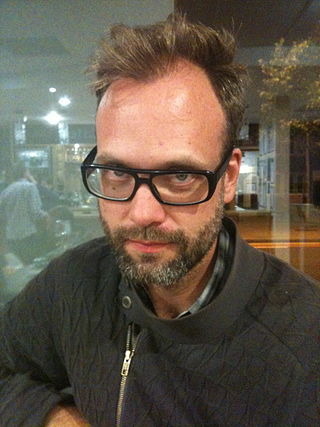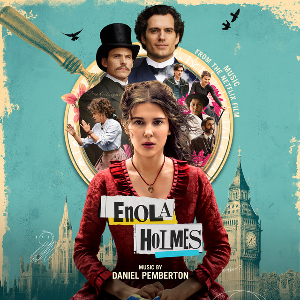
Hans Florian Zimmer is a German-born American film score composer and music producer. He has won two Oscars and four Grammys and has been nominated for three Emmys and a Tony. Zimmer was also named on the list of Top 100 Living Geniuses, published by The Daily Telegraph in 2007.

Joby Talbot is a British composer. He has written for a wide variety of purposes, with a broad range of styles, including instrumental and vocal concert music, film and television scores, pop arrangements and works for dance. He is known, to sometimes disparate audiences, for quite different works.

Elliot Goldenthal is an American composer of contemporary classical music and film and theatrical scores. A student of Aaron Copland and John Corigliano, he is best known for his distinctive style and ability to blend various musical styles and techniques in original and inventive ways. He won the Academy Award for Best Original Score in 2002 for his score to the motion picture Frida, directed by his longtime partner Julie Taymor.

127 Hours: Music from the Motion Picture is the soundtrack to Danny Boyle's 2010 film of the same name. It was composed by Academy Award Winner A. R. Rahman, Boyle's previous collaborator on Slumdog Millionaire. The score, centred on guitar, was recorded mainly in London and was completed in three weeks. The soundtrack was released digitally on 2 November and physically on 22 November, by Interscope Records and Fox Music. The score is briefly orchestral and the song's main theme, "If I Rise" features Rahman playing the Harpejji.
Daniel Pemberton is an English composer and songwriter. Primarily working in film, television, and video games, he is best known for composing the scores for the film Spider-Man: Into the Spider-Verse and its sequel Spider-Man: Across the Spider-Verse, the latter of which earned him a number of award nominations, including at the Golden Globes and the Critics' Choice Awards. He has also received recognition for his work in films such as Steve Jobs, Motherless Brooklyn, The Trial of the Chicago 7, Being the Ricardos, and The Rescue, as well as the LittleBigPlanet series of games.
Andrew John Skeet is an English musician, composer and music producer. He has written scores for television and film and worked with many well-known composers and artists as an arranger, orchestrator and conductor.

Steve Jobs is a 2015 biographical drama film directed by Danny Boyle and written by Aaron Sorkin. A British-American co-production, it was adapted from the 2011 biography by Walter Isaacson and interviews conducted by Sorkin. The film covers fourteen years in the life of Apple Inc. co-founder Steve Jobs, specifically ahead of three press conferences he gave during that time - the formal unveiling of the Macintosh 128K on January 24, 1984; the unveiling of the NeXT Computer on October 12, 1988; and the unveiling of the iMac G3 on May 6, 1998. Jobs is portrayed by Michael Fassbender, with Kate Winslet as Joanna Hoffman and Seth Rogen, Katherine Waterston, Michael Stuhlbarg, and Jeff Daniels in supporting roles.

Dunkirk (Original Motion Picture Soundtrack) is the soundtrack to the 2017 film of the same name directed by Christopher Nolan, released under WaterTower Music on 21 July 2017, the same day as the film's theatrical release. The score was composed and created by Hans Zimmer, who collaborated with Lorne Balfe, Andrew Kawczynski, Steve Mazzaro, and Benjamin Wallfisch to provide additional music. It was recorded at a 11-month period during early-2016 and several instrumentation and sounds were modified to create intensity in the score. Nolan and Zimmer wanted to create suspense through cinematography and music, hence Zimmer had written several tracks to accommodate the auditory Shepard tone illusion, a feature that has been explored in Nolan's previous films.
The soundtrack for the 2018 American animated superhero film Spider-Man: Into the Spider-Verse, based on the Miles Morales incarnation of the Marvel Comics character Spider-Man and produced by Sony Pictures Animation, consists of a soundtrack featuring original songs written for and inspired by the film and an original score composed by Daniel Pemberton. The soundtrack was released under the title Spider-Man: Into the Spider-Verse under the Republic Records label on December 14, 2018, while Pemberton's score was released as Spider-Man: Into the Spider-Verse under the Sony Classical label three days later.

The Trial of the Chicago 7 (Music from the Netflix Film) is the soundtrack to the 2020 film The Trial of the Chicago 7, directed by Aaron Sorkin. Daniel Pemberton written and composed the film score in his third collaboration with Sorkin after Steve Jobs (2015) and Molly's Game (2017). The soundtrack, which featured three original songs performed by British singer Celeste, was released digitally under American record label Varèse Sarabande and Universal Music Group on October 16, 2020. A physical CD edition of the soundtrack was released on November 20.

The Jungle Book (Original Motion Picture Soundtrack) is the soundtrack album to the 2016 eponymous Disney film, which is a live-action/CGI adaptation of the 1967 animated film of the same name. Directed by Jon Favreau, the film features musical score composed and conducted by his frequent collaborator John Debney, mostly drawing from George Bruns' original music. Few of the tracks were incorporated from the 1967 film's soundtrack written by Sherman Brothers and Terry Gilkyson. The score was recorded at Los Angeles, California and New Orleans, with prominent players and large orchestral members recording the score. Walt Disney Records released the film's soundtrack on April 15, 2016. It received positive reviews for the musical score, as well as incorporated songs from the 1967 film, being well received. John Debney missed the nomination for Academy Award for Best Original Score, though at the Hollywood Music in Media Awards, he won Best Original Score – Sci-Fi/Fantasy Film as well as receiving a Satellite Award for Best Original Score nomination.

Mank (Original Music Score) is the score album for David Fincher's 2020 film of the same name, composed by Trent Reznor and Atticus Ross. It was released by The Null Corporation label on December 4, 2020, coinciding with the worldwide release on Netflix. The film marks Fincher's fourth collaboration with Reznor and Ross after the Academy Award-winning score for The Social Network (2010), The Girl with the Dragon Tattoo (2011) and Gone Girl (2014). Both Reznor and Ross used period-authentic instrumentation from the 1930s and 40s, instead of their synth-heavy style. The orchestral sections were performed by each members at their homes, due to the COVID-19 pandemic lockdown.

Inside Out: Original Soundtrack is the soundtrack album to Disney/Pixar's 2015 film of the same name, produced by Pixar Animation Studios and Walt Disney Pictures. Directed by Pete Docter, the film featured musical score composed by Michael Giacchino. This is the second collaboration between Giacchino and Docter, after previously working on Up, which fetched the former, an Academy Award for Best Original Score. Giacchino termed the score as "more emotional in comparison to the score for Up" and also being "more personal" due to his experience on parenthood. The score was recorded between January and May 2015, and featured more orchestral and symphonic music accompanied by a range of instruments, from piano, guitar, drum, organ and harp.

The Artist (Original Motion Picture Soundtrack) is the soundtrack album to the 2011 French comedy-drama film of the same name directed by Michel Hazanavicius, and stars Jean Dujardin and Bérénice Bejo in the lead. The film features original score composed by Ludovic Bource, Michel's norm collaborator, and the album consists of 24 tracks of Bource's score, which also incorporates works from other composers such as Alberto Ginastera's "Estancia".

Arrival (Original Motion Picture Soundtrack) is the soundtrack composed by Jóhann Jóhannsson for Denis Villeneuve's 2016 film Arrival. It was released under Deutsche Grammophon on November 11, 2016, the same day as the film's theatrical release. The score was met with critical acclaim and received accolades at various ceremonies, including a nomination for the BAFTA Award for Best Original Music and Golden Globe Award for Best Original Score, but was ruled ineligible for contention at the 89th Academy Awards.

Argo (Original Motion Picture Soundtrack) is a score album composed by Alexandre Desplat to the Academy Award-winning historical drama thriller film Argo. The film was directed by Ben Affleck, from a screenplay written by Chris Terrio, which was adapted from U.S. Central Intelligence Agency operative Antonio J. Mendez's eponymous novel released in 1999, his memoir The Master of Disguise, and the Wired article by Joshuah Bearman, "The Great Escape: How the CIA Used a Fake Sci-Fi Flick to Rescue Americans from Tehran" (2007); Affleck also starred in the lead role as Mendez. The score album was released on October 9, 2012 by WaterTower Music, three days ahead of the film's release.

Enola Holmes (Music from the Netflix Film) is a film score soundtrack composed by Daniel Pemberton for the 2020 film of the same name. Pemberton described the score as a "blend of melodic and emotional orchestral music coupled with a nice level of messy quirky oddness". The score was released by Milan Records on September 23, 2020, the same day as the film. A vinyl edition of the soundtrack was released on June 4, 2021. The score received positive responses and praise from critics.

Selma: Music from the Motion Picture is the soundtrack album accompanying the 2014 historical drama film of the same name directed by Ava DuVernay. The film is scored by jazz pianist Jason Moran, in his feature film scoring debut. Moran had agreed to be a part of the project, as jazz and activism being integral to each other, which brought the origins of black music in America. He composed an orchestral music which had a subtle and minimalistic approach throughout the film, except for few sequences, which needed a grandeur music.

Weird: The Al Yankovic Story is the soundtrack album to the 2022 film Weird: The Al Yankovic Story, a satirical biopic, loosely based on the life and career of comedy musician "Weird Al" Yankovic, who is also credited as executive producer and co-writer of the film. The film, co-written and directed by Eric Appel, stars Daniel Radcliffe as Yankovic, along with Evan Rachel Wood, Rainn Wilson, Toby Huss, Arturo Castro, and Julianne Nicholson in supporting roles.

Being the Ricardos (Amazon Original Motion Picture Soundtrack) is the soundtrack to the 2021 film Being the Ricardos directed by Aaron Sorkin, about the relationship between I Love Lucy stars Lucille Ball and Desi Arnaz, played by Nicole Kidman and Javier Bardem. The score composed by Daniel Pemberton was released by Lakeshore Records on December 17, 2021. It received a nomination at the 75th British Academy Film Awards for Best Original Music.

















